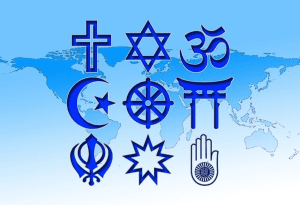
Pope Francis is well acquainted with controversy. Most recently, he raised some eyebrows with his comment on comparative religions. Speaking in Singapore, Pope Francis remarked, “They [the various religions] are like different languages in order to arrive at God, but God is God for all.”
Putting aside Pope Francis’s effort to ingratiate himself with a religiously mixed audience, I want to examine the issue of religious “equality.” In this paper, I will explore whether all religions are essentially equal regarding their truth claims and, more specifically, whether all religions lead to God.
I will begin by defining – in general terms – what religion is and what is meant by God. I will conclude by addressing whether the Pope is correct in stating that all religions “arrive at God.”
What Is Religion?
The number of religions worldwide varies from approximately four to ten thousand, depending on one’s source. Complicating matters is the fact that there is no fixed definition of what constitutes a religion.
For example, is Buddhism a religion despite not worshipping a deity? What about secularism or atheism? Are they religions after a fashion?
We can stipulate that religion must be systematic, ritualistic, and comprise worship and prayer (or supplication or meditation). Limiting ourselves to the biblical faiths, we can further define religion as the moral virtue by which a person is disposed to render to God the worship he deserves. Religion is also a composite of all the virtues that arise from a human being’s relationship to God as the author of his or her being. Religion thus corresponds to the practice of piety toward God as Creator of the universe.
Having provided a brief synopsis of religion, I turn to whether they are all equally true.
Do All Religions Lead To God?
When we ask whether all religions are true, we ask whether they lead to God. Owing to space restraints, I will limit the question to the three biblical faiths: Judaism, Islam, and Christianity.
To ascertain whether these three traditions “arrive at God,” we must state criteria for making judgments. That is, we must have an objective standard with which to judge. For this, we must define our object, to wit, God.
This task immediately presents difficulties. First, the God depicted in the Bible is eternal (Psalm 90:2; Deuteronomy 32:40). To define something means to limit the subject, and that which is eternal has no limits. Fortunately, philosophy can be helpful here.
From the standpoint of philosophy, God is the eternal first cause of existence itself—what Aristotle called “the unmoved mover.” For Aristotle, as for Thomas Aquinas, movement was synonymous with change.
All creation is contingent; it relies on another for its change or cause. Moreover, there cannot be an infinite regress of change or cause. Therefore, God is the cause of this “movement” or change who itself is not moved or changed.
Concisely, we may define God as “A spirit, infinite, eternal, and unchangeable, in his being, wisdom, power, holiness, justice, goodness, and truth.” (Westminster Shorter Catechism).
The second part of Pope Francis’s statement must be admitted as accurate. If such an all-powerful and eternal God exists, He must be the cause of all and, therefore, the God of all.
The second criterion or standard for this project entails determining which, if any, of the teachings and practices of the three faith traditions are congruent with the teachings and practices of the God of the Bible. Again, one encounters difficulties.
The Same God?
Since the Bible is common to the three faiths, it seems a logical point of departure. Unfortunately, where Christianity accepts the New Testament, Islam views it as having been corrupted, and Judaism denies that Jesus is God. Still, there are numerous similarities.
All three faiths are monotheistic, accepting the existence of only one God. Further, they have a common “father” in that they trace their traditions to Abraham.
Of course, there are significant differences among the three religions. These differences center on the nature of God and the Messiah. Judaism believes God is utterly transcendent and omnipotent while also believing in a personal God who is concerned about people’s lives. Similarly, Christianity also believes that God is a personal being intimately involved in his creation. Uniquely, Christianity understands God as a trinity of persons, all of whom share the one divine nature. In Islam, God is also seen as absolutely transcendent. However, Islam rejects the concept of a personal God.
These differences extend to views on the Messiah. In Judaism, the Messiah is still to come and is expected to bring peace and justice to the world. In Christianity, Jesus is considered the Son of God and the Messiah, who fulfilled prophecy and brought salvation to humanity through his death and resurrection. Islam accepts Jesus as a Messiah but rejects the belief that He is the son of God.
Concepts And Languages
In returning to Pope Francis’s analogy of religions and language, I want to comment on the relationship between concepts and terms. A concept (or idea) exists only in the mind(s) of those who hold it. Terms are the signs we use to manifest those concepts. Think of God. You now have a concept of God in your mind. Deus in Latin, Dieu in French, and Gott in German are all terms in different languages to denote the same concept of God.
Conclusion
While Pope Francis’s remarks may have caused some consternation among the Catholic faithful, his comments do not deviate dramatically from the Catechism.
Of the non-Catholic faiths, we may say that “Those who, through no fault of their own, do not know the Gospel of Christ or his Church, but who nevertheless seek God with a sincere heart and, moved by grace, try in their actions do his will as they know it through the dictates of their conscience – those too may achieve eternal salvation.” (Catechism of the Catholic Church, paragraph 847).
Ultimately, any effort to create equality in the truth claims of the world’s religions stops with Jesus Christ (whether one recognizes this fact or not). Only in and through Christ can one hope of attaining eternal life (see John 14:6).













